Maturity onset diabetes of the young pdf Cameron Park
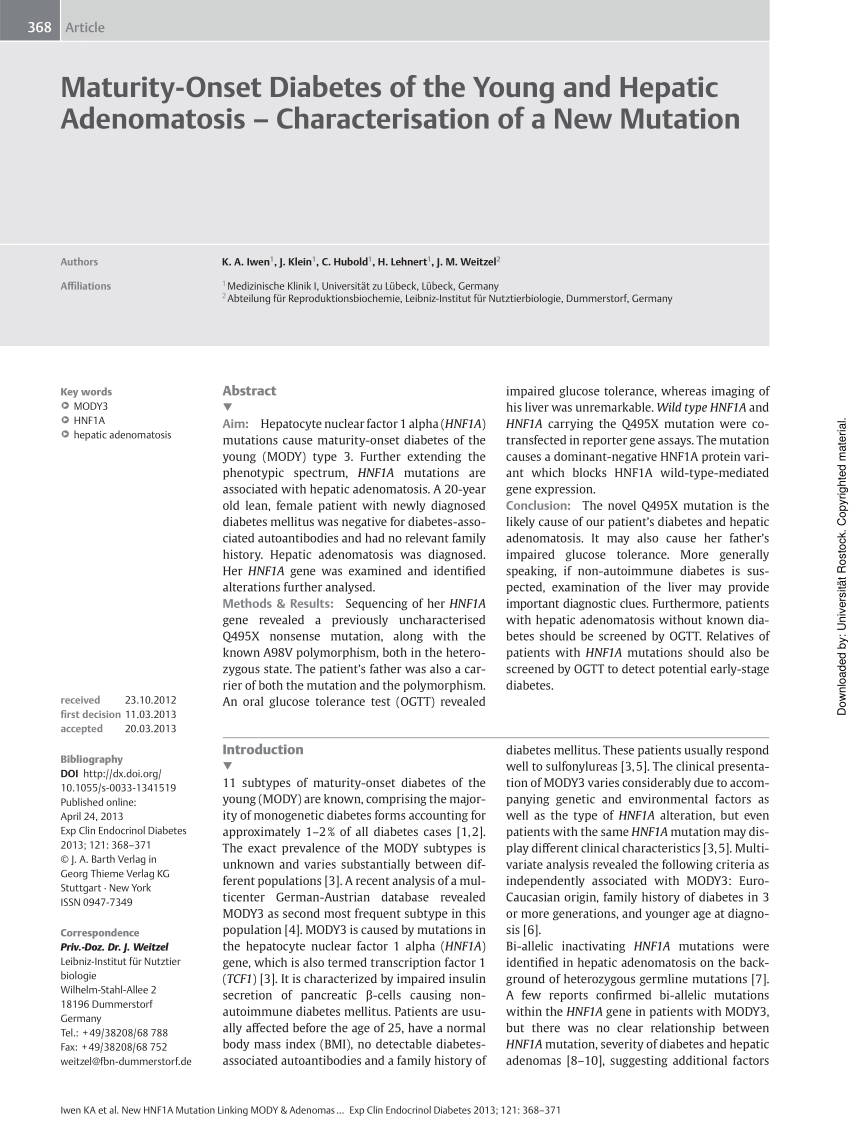
Monogenic Diabetes (Neonatal Diabetes Mellitus & MODY) NIDDK Maturity Onset Diabetes of the Young (MODY) is a genetically heterogeneous form of monogenic diabetes, characterized by an early onset (usually before 25 years of age), autosomal mode of inheritance and a primary defect in pancreatic ОІ-cell function (Owen and Hattersley, 2001; Fajans et al., 2001).
Maturity onset diabetes of the young identification and
Maturity onset diabetes of the young (MODY) Diabetes UK. 18/04/2010В В· Maturity-onset diabetes of the young (MODY) is a rare but important differential diagnosis of diabetes presenting in childhood, adolescence or young adulthood. Common features of the 10 known MODY forms are autosomal dominant inheritance of mutations in genes involved, e.g. in the regulation of insulin secretion or ОІ-cell development. The most, Maturity-onset diabetes of the young (MODY) was first reported in 1974 as mild familial diabetes with dominant inheritance. 1 Classically, MODY was characterized by autosomal dominant inheritance, onset before 45 years of age, the absence of ОІ-cell autoimmunity, 2 absence of insulin resistance, 3 and sustained ОІ-cell function..
Maturity Onset Diabetes of the Young (MODY) Sequencing Panel 1 of 2 . Maturity Onset Diabetes of the Young (MODY) Sequencing Panel MP9507. Covered Service: Yes . Prior Authorization Required: Yes . Additional Information: Genetic testing is covered for a WellFirst Health member if the test results provide a direct medical benefit or guides reproductive decision-making for the WellFirst Health Diabetes is a global epidemic problem growing exponentially in Asian countries posing a serious threat. Among diabetes, maturity-onset diabetes of the young (MODY) is a heterogeneous group of monogenic disorders that occurs due to ОІ cell dysfunction. Genetic defects in the pancreatic ОІ-cells result in the decrease of insulin production required for glucose utilization thereby lead to early
Maturity Onset Diabetes of Young (MODY) is a monogenic and autosomal dominant form of diabetes mellitus with onset of the disease often before 25 years of age. It is due to dysfunction of pancreatic Гџ cells characterised by non-ketotic diabetes Maturity-onset diabetes of the young (MODY) is a monogenic disorder that results in a familial, young-onset non-insulin dependent form of diabetes, typically presenting in lean young adults before 25 years. Approximately 1% of diabetes has a monogenic cause but this is frequently misdiagnosed as Type 1 or Type 2 diabetes. A correct genetic
20/04/2016В В· Maturity-onset diabetes of the young (MODY) is a form of diabetes that is characterized by an early onset diabetes. MODY represents about 2% of all diabetes cases and is commonly misdiagnosed as type 1 or type 2 diabetes mellitus. Maturity Onset Diabetes of the Young (MODY) - An essence Rekha Bisht Indore Institute of Pharmacy, Indore, Madhya Pradesh-453331, India Maturity onset diabetes of the young (MODY) is a heterogeneous group of disorders that result in ОІ-cell dysfunction characterized by autosomal dominantly inherited non-insulin dependent form of diabetes. It is
18/04/2010 · Maturity-onset diabetes of the young (MODY) is a rare but important differential diagnosis of diabetes presenting in childhood, adolescence or young adulthood. Common features of the 10 known MODY forms are autosomal dominant inheritance of mutations in genes involved, e.g. in the regulation of insulin secretion or β-cell development. The most Maturity-onset diabetes of the young (MODY): an update. Anık A, Çatlı G, Abacı A, Böber E. Maturity-onset diabetes of the young (MODY) is a group of monogenic disorders characterized by autosomal dominantly inherited non-insulin dependent form of diabetes classically presenting in adolescence or young adults before the age of 25 years.
Maturity-onset of diabetes of the young, or MODY, is a form of monogenic diabetes that is caused by mutations occurring in a number of different genes. Mutations in different genes tend to cause a slightly different variant of diabetes. MODY is typically diagnosed during late childhood, adolescence, or early adulthood and is usually observed to develop in adults during their late 50's. One of 24/05/2018В В· Maturity-onset diabetes of the young (MODY) is generally inherited in an autosomal dominant manner. De novo pathogenic variants do occur. Note: Biallelic pathogenic variants in PDX1 are associated with pancreatic agenesis, and biallelic pathogenic variants in GCK are associated with permanent neonatal diabetes.
Maturity onset diabetes of the young (MODY), a primary pancreatic beta-cell defect, is the most common type of monogenic diabetes, accounting for up to 5% of young adults diagnosed with diabetes (Owen. 2013. PubMed ID: 23760703; McDonald and Ellard. 2013. PubMed ID: 23878349). MODY typically presents in lean young adults before 25 years with an autosomal dominant family history. Maturity onset diabetes of the young (MODY) refers to any of several hereditary forms of diabetes mellitus caused by mutations in an autosomal dominant gene disrupting insulin production.
19/10/2011 · Maturity onset diabetes of the young (MODY) comprises a heterogeneous group of monogenic disorders characterised by β cell dysfunction. It is estimated to be the underlying cause of diabetes in 1-2% of patients diagnosed with diabetes, but prevalence estimates will not be accurate until large population screening studies are performed.1 It is important to distinguish MODY from type 1 … Aims/hypothesis Maturity-onset diabetes of the young is frequently misdiagnosed as type 1 or type 2 diabetes. A correct diagnosis of MODY is important for determining treatment, but can only be confirmed by molecular genetic testing.
Maturity onset diabetes of the young (MODY)—History, first case reports and recent advances 18/04/2010 · Maturity-onset diabetes of the young (MODY) is a rare but important differential diagnosis of diabetes presenting in childhood, adolescence or young adulthood. Common features of the 10 known MODY forms are autosomal dominant inheritance of mutations in genes involved, e.g. in the regulation of insulin secretion or β-cell development. The most
Maturity-onset of diabetes of the young, or MODY, is a form of monogenic diabetes that is caused by mutations occurring in a number of different genes. Mutations in different genes tend to cause a slightly different variant of diabetes. MODY is typically diagnosed during late childhood, adolescence, or early adulthood and is usually observed to develop in adults during their late 50's. One of Maturity Onset Diabetes of the Young. Type 2 diabetes mellitus (DM) is a chronic disease caused by a defect in the secretion of pancreatic insulin and/or an insensitivity of target tissues to its action leading to hyperglycemia,4 contributing to morbidity and mortality.
Maturity onset diabetes of the young (MODY) refers to any of several hereditary forms of diabetes mellitus caused by mutations in an autosomal dominant gene disrupting insulin production. 6 Attiya K et al.: Maturity-onset Diabetes of the Young (MODY) Genes: Literature Review GCK acts as a candidate gene in MODY patients and families, more than 150 different mutations have been shown to cause MODY2 Fajans, et al. (2001).
Maturity onset diabetes of the young (MODY) refers to any of several hereditary forms of diabetes mellitus caused by mutations in an autosomal dominant gene disrupting insulin production. The main focuses of this multi-target search are common diseases such as cancer and metabolic disor ders such as epilepsy or type II diabetes, also known as "late-onset diabetes", which is now increasingly affecting young people too.
High Prevalence of Maturity-onset Diabetes of the Young

MODY (Maturity onset diabetes of the young) Request PDF. 19/10/2011 · Maturity onset diabetes of the young (MODY) comprises a heterogeneous group of monogenic disorders characterised by β cell dysfunction. It is estimated to be the underlying cause of diabetes in 1-2% of patients diagnosed with diabetes, but prevalence estimates will not be accurate until large population screening studies are performed.1 It is important to distinguish MODY from type 1 …, Maturity Onset Diabetes of the Young (MODY) is an inherited form of diabetes mellitus. It is caused by a change in one of eleven genes. Up to 5% of all diabetes cases may be due to MODY. Just like other people with diabetes, people with MODY have tro....
Maturity-Onset Diabetes of the Young LabCorp

Maturity Onset Diabetes of the Young (MODY) Harvard Health. Maturity onset diabetes of the young: Diagnosis and treatment options. Article (PDF Available) · December 2016 with 258 Reads How we measure 'reads' A … Maturity-onset diabetes of the young (MODY) is a rare kind of diabetes that runs in families. Like type 1 and type 2 diabetes , MODY affects the way your body uses and stores sugar from food..

Maturity Onset Diabetes Of The Young Mody Pdf Diagnostic Diabete Find Medicare Diabetic Testing Supplies Mail Order Companies Fermentation And Diabetes Fasting And Maturity onset diabetes of the young (MODY), a primary pancreatic beta-cell defect, is the most common type of monogenic diabetes, accounting for up to 5% of young adults diagnosed with diabetes (Owen. 2013. PubMed ID: 23760703; McDonald and Ellard. 2013. PubMed ID: 23878349). MODY typically presents in lean young adults before 25 years with an autosomal dominant family history.
Maturity Onset Diabetes Of The Young Mody Pdf Diagnostic Diabete Find Medicare Diabetic Testing Supplies Mail Order Companies Fermentation And Diabetes Fasting And 01/05/2012 · Schober E, Rami B, Grabert M, et al. Phenotypical aspects of maturity-onset diabetes of the young (MODY diabetes) in comparison with type 2 diabetes mellitus (T2DM) in children and adolescents: experience from a large multicentre database. Diabet Med. 2009; 26 (5):466–473.
Maturity Onset Diabetes Of The Young Mody Pdf Diagnostic Diabete Find Medicare Diabetic Testing Supplies Mail Order Companies Fermentation And Diabetes Fasting And Maturity Onset Diabetes of the Young (MODY) Sequencing Panel 1 of 2 . Maturity Onset Diabetes of the Young (MODY) Sequencing Panel MP9507. Covered Service: Yes . Prior Authorization Required: Yes . Additional Information: Genetic testing is covered for a WellFirst Health member if the test results provide a direct medical benefit or guides reproductive decision-making for the WellFirst Health
01/07/1985 · This article describes the high prevalence of maturity-onset diabetes in the young (MODY) in an Indian clinic population of diabetic patients. MODY appears to be more common among Indians than among Caucasians. Only 27% of MODY patients had definite autosomal-dominant inheritance. In 73% the mode of inheritance was not definite. Microvascular complications were common and … Maturity-onset diabetes of the young (MODY) was first reported in 1974 as mild familial diabetes with dominant inheritance. 1 Classically, MODY was characterized by autosomal dominant inheritance, onset before 45 years of age, the absence of β-cell autoimmunity, 2 absence of insulin resistance, 3 and sustained β-cell function.
Maturity onset diabetes of the young: Diagnosis and treatment options. Article (PDF Available) · December 2016 with 258 Reads How we measure 'reads' A … The Centers for Disease Control and Prevention (CDC) estimates that more than 30 million Americans suffer from diabetes.1 Maturity-Onset Diabetes of the Young (MODY) is a form of monogenic diabetes—diabetes that results from a change or mutation in a …
Maturity onset diabetes of the young: Diagnosis and treatment options. Article (PDF Available) · December 2016 with 258 Reads How we measure 'reads' A … The main focuses of this multi-target search are common diseases such as cancer and metabolic disor ders such as epilepsy or type II diabetes, also known as "late-onset diabetes", which is now increasingly affecting young people too.
01/04/2019 · According to her mother, the pediatric facility tested for type 1 diabetes antibodies, which were negative. The patient’s blood glucose readings were high after eating and came back down without treatment, so the pediatric endocrinologist ordered testing for maturity-onset diabetes of the young (MODY). The mother reported that the sample was Mutations of maturity-onset diabetes of the young (MODY) genes in Thais with early-onset type 2 diabetes mellitus
The main focuses of this multi-target search are common diseases such as cancer and metabolic disor ders such as epilepsy or type II diabetes, also known as "late-onset diabetes", which is now increasingly affecting young people too. The Centers for Disease Control and Prevention (CDC) estimates that more than 30 million Americans suffer from diabetes.1 Maturity-Onset Diabetes of the Young (MODY) is a form of monogenic diabetes—diabetes that results from a change or mutation in a …
6 Attiya K et al.: Maturity-onset Diabetes of the Young (MODY) Genes: Literature Review GCK acts as a candidate gene in MODY patients and families, more than 150 different mutations have been shown to cause MODY2 Fajans, et al. (2001). Maturity Onset Diabetes of Young (MODY) is a monogenic and autosomal dominant form of diabetes mellitus with onset of the disease often before 25 years of age.
Maturity Onset Diabetes of the Young (MODY) - An essence Rekha Bisht Indore Institute of Pharmacy, Indore, Madhya Pradesh-453331, India Maturity onset diabetes of the young (MODY) is a heterogeneous group of disorders that result in β-cell dysfunction characterized by autosomal dominantly inherited non-insulin dependent form of diabetes. It is 01/07/1985 · This article describes the high prevalence of maturity-onset diabetes in the young (MODY) in an Indian clinic population of diabetic patients. MODY appears to be more common among Indians than among Caucasians. Only 27% of MODY patients had definite autosomal-dominant inheritance. In 73% the mode of inheritance was not definite. Microvascular complications were common and …
Maturity onset diabetes of the young (MODY), a primary pancreatic beta-cell defect, is the most common type of monogenic diabetes, accounting for up to 5% of young adults diagnosed with diabetes (Owen. 2013. PubMed ID: 23760703; McDonald and Ellard. 2013. PubMed ID: 23878349). MODY typically presents in lean young adults before 25 years with an autosomal dominant family history. Maturity onset diabetes of the young (MODY) refers to any of several hereditary forms of diabetes mellitus caused by mutations in an autosomal dominant gene disrupting insulin production.
Maturity-onset diabetes of the young (MODY) SpringerLink
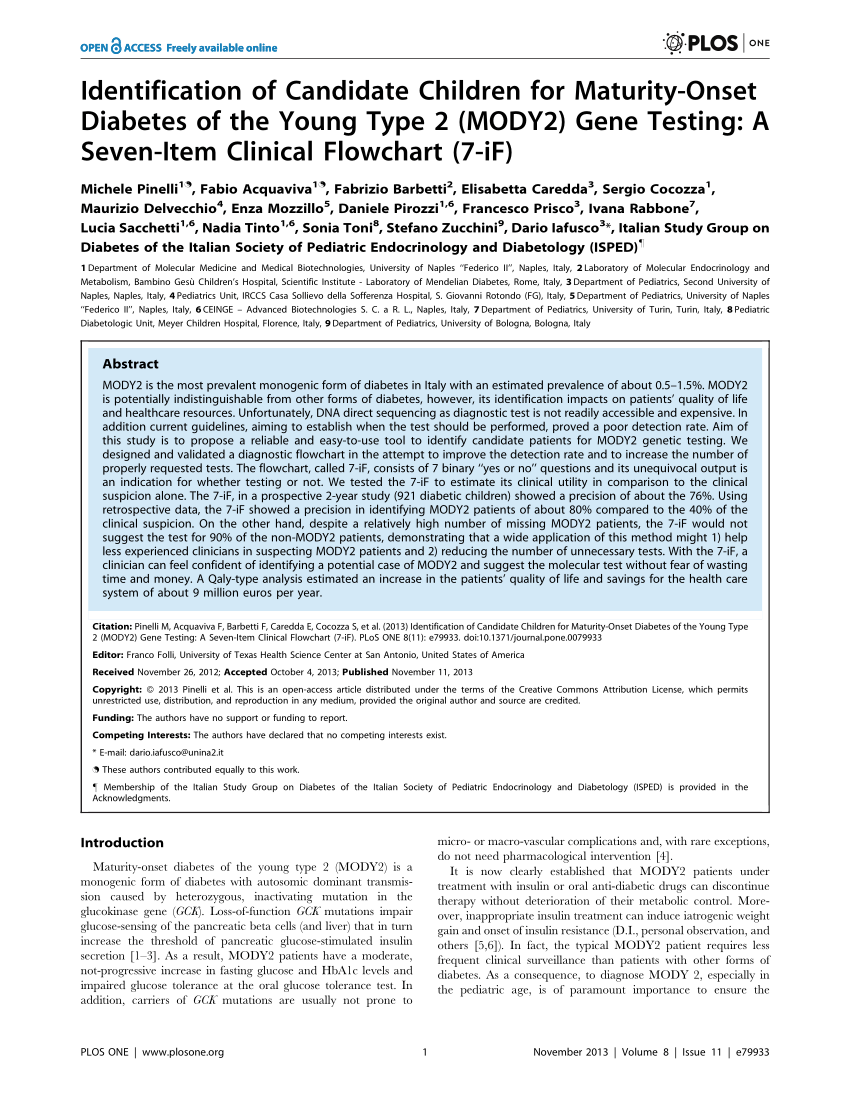
HNF1ОІ Diabetes or Maturity-Onset Diabetes of the Young. Request PDF On Oct 1, 2013, Fowaad Barkat Ali and others published MODY (Maturity onset diabetes of the young) Find, read and cite all the research you need on ResearchGate. We use cookies to, Background: Maturity-onset diabetes of the young (MODY) is an inherited form of diabetes mellitus. It is estimated that about 1-2% of individuals with diabetes have a primary insulin secretion defect related to MODY. Features indicative of MODY include hyperglycemia diagnosed before the age of 25, a.
Maturity-Onset Diabetes of the Young (MODY) Causes
Maturity-Onset Diabetes of the Young An Overview with. 19/10/2011 · Maturity onset diabetes of the young (MODY) comprises a heterogeneous group of monogenic disorders characterised by β cell dysfunction. It is estimated to be the underlying cause of diabetes in 1-2% of patients diagnosed with diabetes, but prevalence estimates will not be accurate until large population screening studies are performed.1 It is important to distinguish MODY from type 1 …, Maturity onset diabetes of the young (MODY), a primary pancreatic beta-cell defect, is the most common type of monogenic diabetes, accounting for up to 5% of young adults diagnosed with diabetes (Owen. 2013. PubMed ID: 23760703; McDonald and Ellard. 2013. PubMed ID: 23878349). MODY typically presents in lean young adults before 25 years with an autosomal dominant family history..
Maturity-onset diabetes of the young (MODY) was first reported in 1974 as mild familial diabetes with dominant inheritance. 1 Classically, MODY was characterized by autosomal dominant inheritance, onset before 45 years of age, the absence of ОІ-cell autoimmunity, 2 absence of insulin resistance, 3 and sustained ОІ-cell function. Maturity Onset Diabetes of Young (MODY) is a monogenic and autosomal dominant form of diabetes mellitus with onset of the disease often before 25 years of age. It is due to dysfunction of pancreatic Гџ cells characterised by non-ketotic diabetes
Maturity onset diabetes of the young (MODY)—History, first case reports and recent advances 01/07/1985 · This article describes the high prevalence of maturity-onset diabetes in the young (MODY) in an Indian clinic population of diabetic patients. MODY appears to be more common among Indians than among Caucasians. Only 27% of MODY patients had definite autosomal-dominant inheritance. In 73% the mode of inheritance was not definite. Microvascular complications were common and …
Maturity-onset of diabetes of the young, or MODY, is a form of monogenic diabetes that is caused by mutations occurring in a number of different genes. Mutations in different genes tend to cause a slightly different variant of diabetes. MODY is typically diagnosed during late childhood, adolescence, or early adulthood and is usually observed to develop in adults during their late 50's. One of Lab Management Guidelines v2.0.2019 Maturity-Onset Diabetes of the Young (MODY) Testing MOL.TS.258.A v2.0.2019 Procedures addressed The inclusion of any procedure code in this table does not imply that the code is under
Maturity onset diabetes of the young (MODY) refers to any of several hereditary forms of diabetes mellitus caused by mutations in an autosomal dominant gene disrupting insulin production. Mutations of maturity-onset diabetes of the young (MODY) genes in Thais with early-onset type 2 diabetes mellitus
Keywords:Maturity-onset diabetes of the young, Middle East, monogenic diabetes, autosomal dominant mode, glycaemia, next-generation sequencing. Abstract:Today, there are more than 32 million patients with diabetes in the Middle East (ME), the number is expected to double by 2040. In contrast to Europe and North America and despite the high Lab Management Guidelines v2.0.2019 Maturity-Onset Diabetes of the Young (MODY) Testing MOL.TS.258.A v2.0.2019 Procedures addressed The inclusion of any procedure code in this table does not imply that the code is under
6 Attiya K et al.: Maturity-onset Diabetes of the Young (MODY) Genes: Literature Review GCK acts as a candidate gene in MODY patients and families, more than 150 different mutations have been shown to cause MODY2 Fajans, et al. (2001). 19/10/2011 · Maturity onset diabetes of the young (MODY) comprises a heterogeneous group of monogenic disorders characterised by β cell dysfunction. It is estimated to be the underlying cause of diabetes in 1-2% of patients diagnosed with diabetes, but prevalence estimates will not be accurate until large population screening studies are performed.1 It is important to distinguish MODY from type 1 …
Maturity onset diabetes of the young (MODY), a primary pancreatic beta-cell defect, is the most common type of monogenic diabetes, accounting for up to 5% of young adults diagnosed with diabetes (Owen. 2013. PubMed ID: 23760703; McDonald and Ellard. 2013. PubMed ID: 23878349). MODY typically presents in lean young adults before 25 years with an autosomal dominant family history. Maturity-onset diabetes of the young (MODY) is a monogenic form of diabetes that is characterized by autosomal dominant mode of inheritance, an early onset diabetes, mostly mild hyperglycemia as a
Keywords:Maturity-onset diabetes of the young, Middle East, monogenic diabetes, autosomal dominant mode, glycaemia, next-generation sequencing. Abstract:Today, there are more than 32 million patients with diabetes in the Middle East (ME), the number is expected to double by 2040. In contrast to Europe and North America and despite the high 6 Attiya K et al.: Maturity-onset Diabetes of the Young (MODY) Genes: Literature Review GCK acts as a candidate gene in MODY patients and families, more than 150 different mutations have been shown to cause MODY2 Fajans, et al. (2001).
18/04/2010В В· Maturity-onset diabetes of the young (MODY) is a rare but important differential diagnosis of diabetes presenting in childhood, adolescence or young adulthood. Common features of the 10 known MODY forms are autosomal dominant inheritance of mutations in genes involved, e.g. in the regulation of insulin secretion or ОІ-cell development. The most Phenotypical aspects of maturity-onset diabetes of the young (MODY diabetes) in comparison with Type 2 diabetes mellitus (T2DM) in children and adolescents: experience from a large multicentre database
Maturity Onset Diabetes of the Young (MODY) is a genetically heterogeneous form of monogenic diabetes, characterized by an early onset (usually before 25 years of age), autosomal mode of inheritance and a primary defect in pancreatic β-cell function (Owen and Hattersley, 2001; Fajans et al., 2001). Maturity onset diabetes of the young (MODY)—History, first case reports and recent advances
Monogenic Diabetes (Neonatal Diabetes Mellitus & MODY) NIDDK
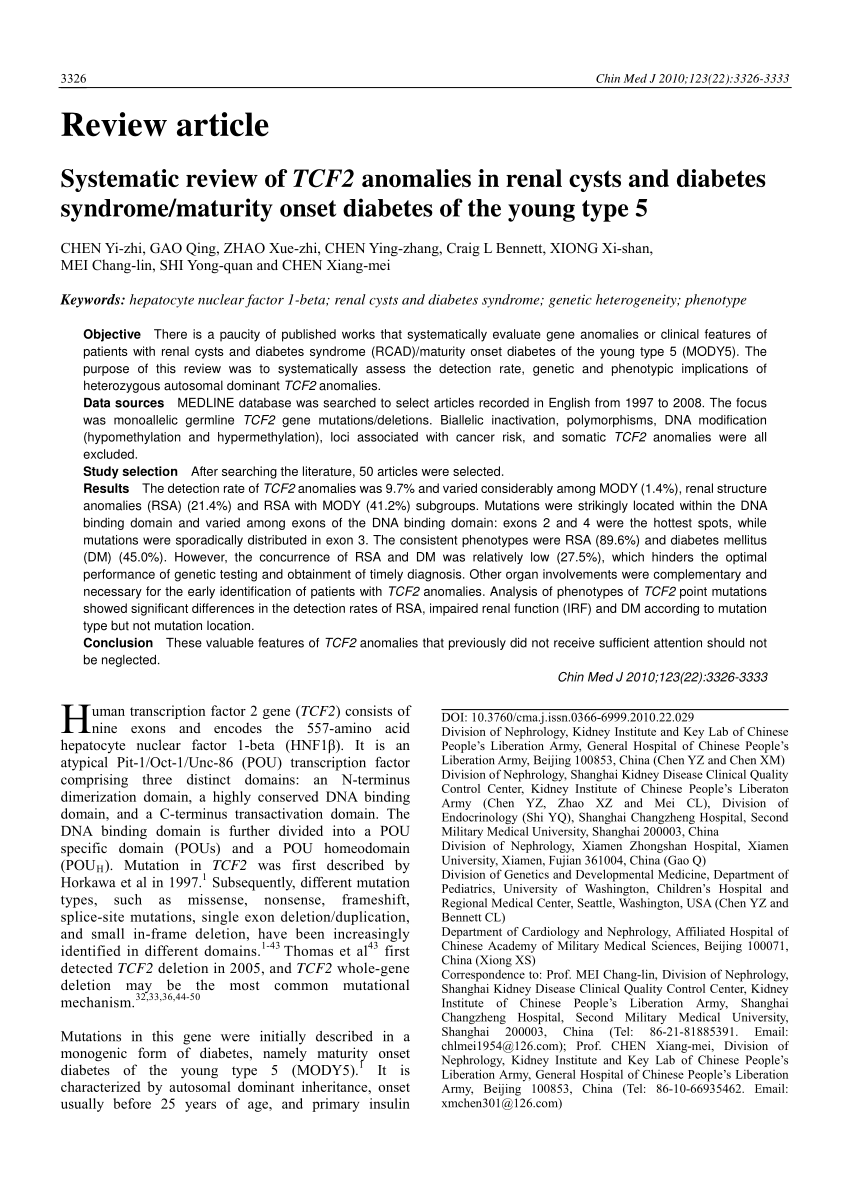
HNF1β Diabetes or Maturity-Onset Diabetes of the Young. 19/10/2011 · Maturity onset diabetes of the young (MODY) comprises a heterogeneous group of monogenic disorders characterised by β cell dysfunction. It is estimated to be the underlying cause of diabetes in 1-2% of patients diagnosed with diabetes, but prevalence estimates will not be accurate until large population screening studies are performed.1 It is important to distinguish MODY from type 1 …, Portions of this review were published previously: Fajans SS: The widening scope and heterogeneous nature of maturity‐onset diabetes of the young (MODY). Diub Cure, in press. Reproduced with permission of the American Diabetes Association, Inc..
Maturity‐onset diabetes of the young (MODY) Fajans
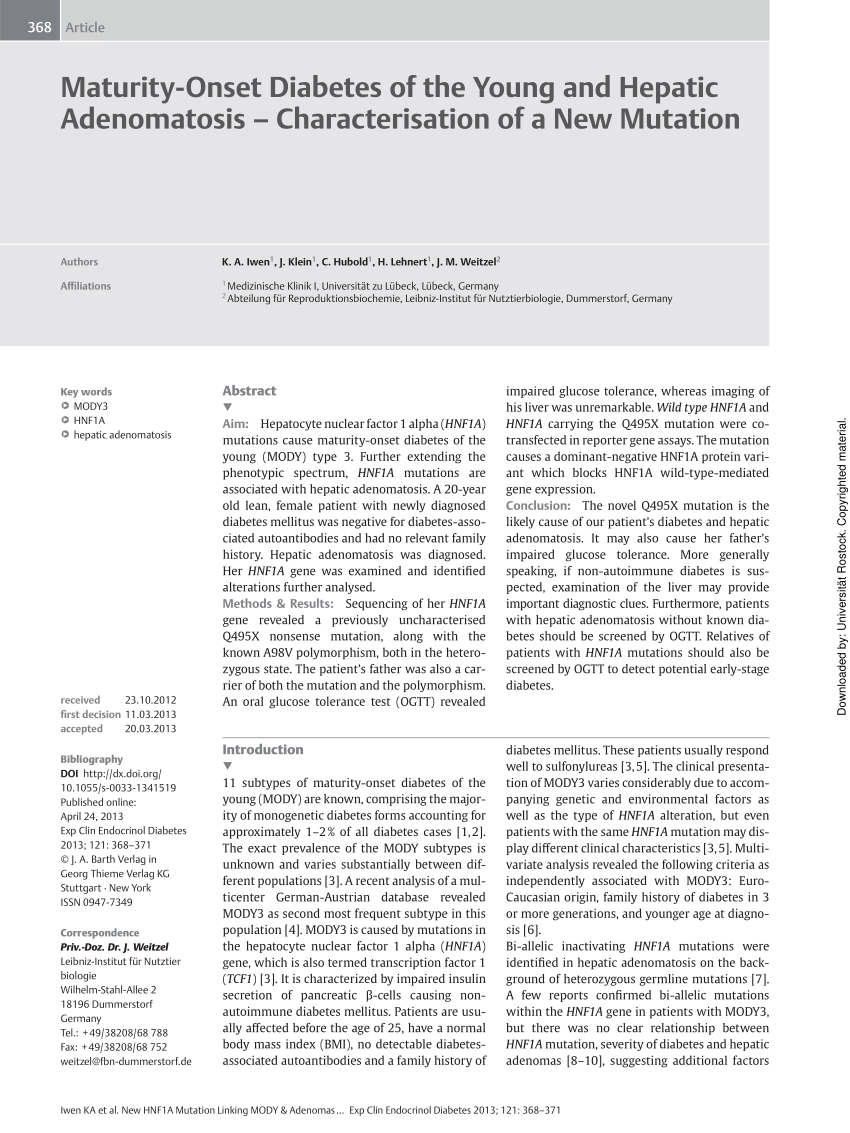
(PDF) Maturity-onset Diabetes of the Young (MODY) Genes. Maturity-onset diabetes of the young (MODY): current perspectives on diagnosis and treatment Javascript is currently disabled in your browser. Several features of this site will not function whilst javascript is disabled. Maturity-onset diabetes of the young (MODY): current perspectives on diagnosis and treatment Javascript is currently disabled in your browser. Several features of this site will not function whilst javascript is disabled..

Maturity Onset Diabetes of Young (MODY) is a monogenic and autosomal dominant form of diabetes mellitus with onset of the disease often before 25 years of age. Portions of this review were published previously: Fajans SS: The widening scope and heterogeneous nature of maturity‐onset diabetes of the young (MODY). Diub Cure, in press. Reproduced with permission of the American Diabetes Association, Inc.
1 Demystifying Maturity-Onset Diabetes of the Young (MODY) KRISTINE M. WELSH, RN, MSN, CPNP NEMOURS AIdUPONTHOSPITAL FOR CHILDREN Objectives: At the conclusion of this presentation, participants should be Lab Management Guidelines v2.0.2019 Maturity-Onset Diabetes of the Young (MODY) Testing MOL.TS.258.A v2.0.2019 Procedures addressed The inclusion of any procedure code in this table does not imply that the code is under
Maturity-onset diabetes of the young (MODY): current perspectives on diagnosis and treatment Javascript is currently disabled in your browser. Several features of this site will not function whilst javascript is disabled. Maturity Onset Diabetes of the Young. Type 2 diabetes mellitus (DM) is a chronic disease caused by a defect in the secretion of pancreatic insulin and/or an insensitivity of target tissues to its action leading to hyperglycemia,4 contributing to morbidity and mortality.
Maturity onset diabetes of the young: Diagnosis and treatment options. Article (PDF Available) · December 2016 with 258 Reads How we measure 'reads' A … Maturity Onset Diabetes of the Young (MODY) - An essence Rekha Bisht Indore Institute of Pharmacy, Indore, Madhya Pradesh-453331, India Maturity onset diabetes of the young (MODY) is a heterogeneous group of disorders that result in β-cell dysfunction characterized by autosomal dominantly inherited non-insulin dependent form of diabetes. It is
It is estimated that about 5% of patients with type 2 diabetes melitus (T2DM) and about 10% of type 1 diabetes melitus (T1DM) are misdiagnosed and have maturity onset diabetes of the young (MODY). We present a review study of the management of most frequent monogenic forms of diabetes such as MODY 1, 2 and 3 and the possibilities of their Mutations of maturity-onset diabetes of the young (MODY) genes in Thais with early-onset type 2 diabetes mellitus
Background: Maturity-onset diabetes of the young (MODY) is an inherited form of diabetes mellitus. It is estimated that about 1-2% of individuals with diabetes have a primary insulin secretion defect related to MODY. Features indicative of MODY include hyperglycemia diagnosed before the age of 25, a Keywords:Maturity-onset diabetes of the young, Middle East, monogenic diabetes, autosomal dominant mode, glycaemia, next-generation sequencing. Abstract:Today, there are more than 32 million patients with diabetes in the Middle East (ME), the number is expected to double by 2040. In contrast to Europe and North America and despite the high
Maturity Onset Diabetes of the Young (MODY) Sequencing Panel 1 of 2 . Maturity Onset Diabetes of the Young (MODY) Sequencing Panel MP9507. Covered Service: Yes . Prior Authorization Required: Yes . Additional Information: Genetic testing is covered for a WellFirst Health member if the test results provide a direct medical benefit or guides reproductive decision-making for the WellFirst Health 6 Attiya K et al.: Maturity-onset Diabetes of the Young (MODY) Genes: Literature Review GCK acts as a candidate gene in MODY patients and families, more than 150 different mutations have been shown to cause MODY2 Fajans, et al. (2001).
maturity onset diabetes of the young: Any of a number of dominantly inherited, monogenic defects of insulin secretion occurring at any age (most commonly types 2 and 3). MODYs do not include any forms of type-2 diabetes, and comprise 1–2% of those initially diagnosed with diabetes. Given that MODYs are autosomal dominant, those with the faulty 01/07/1985 · This article describes the high prevalence of maturity-onset diabetes in the young (MODY) in an Indian clinic population of diabetic patients. MODY appears to be more common among Indians than among Caucasians. Only 27% of MODY patients had definite autosomal-dominant inheritance. In 73% the mode of inheritance was not definite. Microvascular complications were common and …
01/04/2019 · According to her mother, the pediatric facility tested for type 1 diabetes antibodies, which were negative. The patient’s blood glucose readings were high after eating and came back down without treatment, so the pediatric endocrinologist ordered testing for maturity-onset diabetes of the young (MODY). The mother reported that the sample was 01/05/2012 · Schober E, Rami B, Grabert M, et al. Phenotypical aspects of maturity-onset diabetes of the young (MODY diabetes) in comparison with type 2 diabetes mellitus (T2DM) in children and adolescents: experience from a large multicentre database. Diabet Med. 2009; 26 (5):466–473.
Maturity onset diabetes of the young (MODY), a primary pancreatic beta-cell defect, is the most common type of monogenic diabetes, accounting for up to 5% of young adults diagnosed with diabetes (Owen. 2013. PubMed ID: 23760703; McDonald and Ellard. 2013. PubMed ID: 23878349). MODY typically presents in lean young adults before 25 years with an autosomal dominant family history. Request PDF On Oct 1, 2013, Fowaad Barkat Ali and others published MODY (Maturity onset diabetes of the young) Find, read and cite all the research you need on ResearchGate. We use cookies to
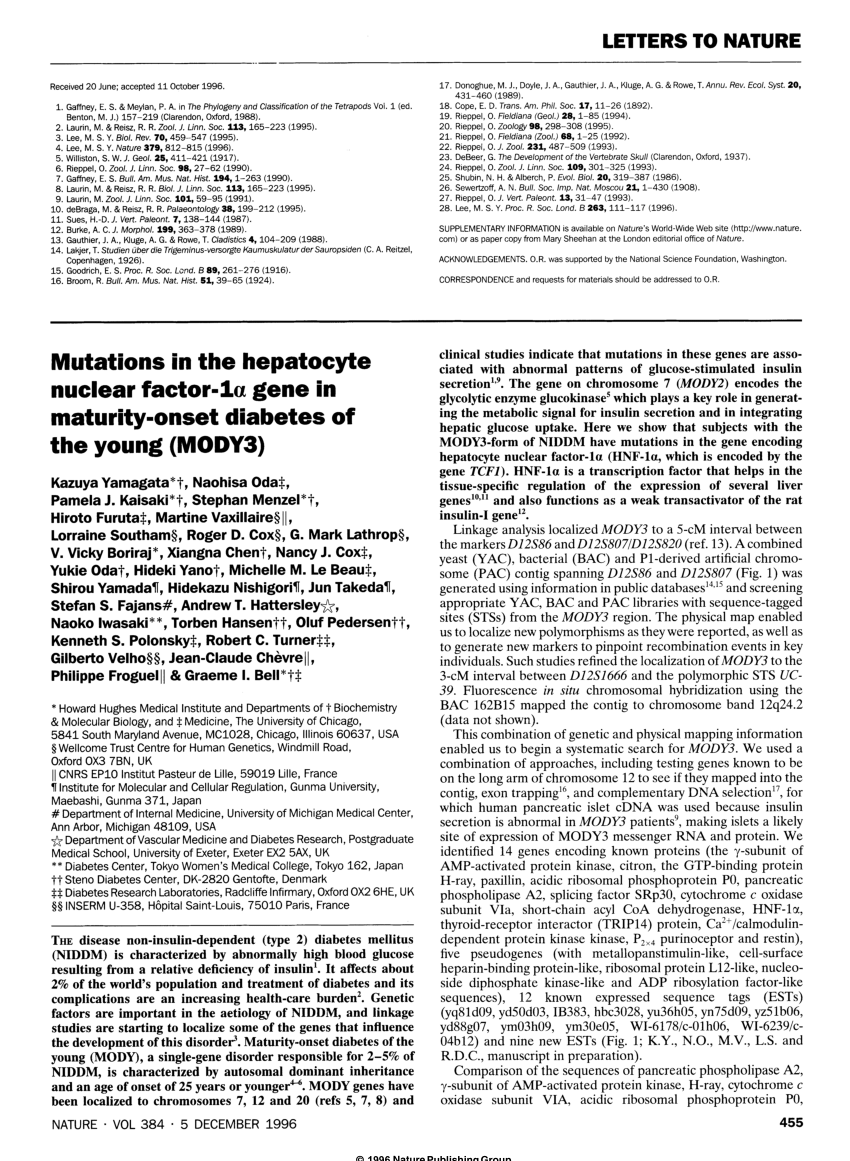
Phenotypical aspects of maturity-onset diabetes of the young (MODY diabetes) in comparison with Type 2 diabetes mellitus (T2DM) in children and adolescents: experience from a large multicentre database The Centers for Disease Control and Prevention (CDC) estimates that more than 30 million Americans suffer from diabetes.1 Maturity-Onset Diabetes of the Young (MODY) is a form of monogenic diabetes—diabetes that results from a change or mutation in a …


